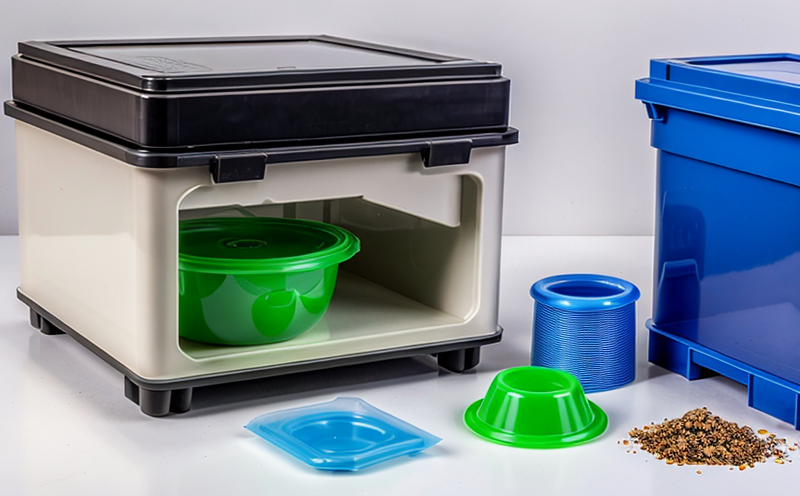ASTM D2240 Plastics Packaging Hardness Testing
The ASTM D2240 standard is a critical tool in the evaluation of plastic packaging materials. This method provides a standardized approach to assessing the hardness or resistance to indentation of rigid plastics, which is essential for ensuring that packaging meets quality and performance expectations. Understanding the mechanical properties of plastic materials is crucial for optimizing design, improving durability, and enhancing consumer safety.
The test involves applying a standard force to a specified indenter (typically a spherical or cylindrical shape) until it penetrates the surface of the specimen by a predetermined depth. This process allows for consistent comparison between different samples under controlled conditions. The measured hardness is reported in units such as Shore Hardness, which provides valuable insights into the material's rigidity and ability to withstand external forces.
Hardness testing plays a pivotal role in various stages of product development, from initial concept design through final quality assurance checks. By measuring hardness, manufacturers can ensure that their plastic packaging components meet specific performance requirements, whether for food contact applications or other environments where durability is paramount. This ensures compliance with relevant regulations and industry standards.
For instance, in the context of food packaging, ensuring proper hardness can prevent issues such as excessive deformation during handling or storage, which could lead to contamination or damage. In medical devices, appropriate hardness levels are essential for preventing accidental punctures or breaks that might compromise the integrity of the device.
The ASTM D2240 method is widely recognized and utilized across numerous industries due to its reliability and consistency. It enables stakeholders to make informed decisions about material selection and design optimization, ultimately contributing to improved product performance and customer satisfaction.
When selecting materials for packaging applications, it's important to consider not only the mechanical properties but also other factors such as flexibility, chemical resistance, and thermal stability. These characteristics are interrelated; for example, a material with high hardness may exhibit lower flexibility or reduced resistance to certain chemicals. Therefore, comprehensive testing is necessary to balance these attributes effectively.
In summary, ASTM D2240 provides a robust framework for evaluating the hardness of rigid plastic materials used in packaging applications. This standardized approach ensures that manufacturers can consistently achieve desired performance characteristics while meeting regulatory requirements and industry best practices.
Applied Standards
The ASTM D2240 standard is part of a broader suite of tests designed to assess the mechanical properties of plastics, including tensile strength, impact resistance, and flexural modulus. These tests are crucial for ensuring that packaging materials meet specific performance criteria in various environments.
- ASTM D790 - Standard Test Method for Flexure Properties of Unvulcanized Rubber and Vulcanized Rubber (Including Thermosetting Plastic Materials): This standard evaluates the flexural properties of rubber and plastic materials, including those used in packaging applications. It provides a method to determine how well a material can withstand bending without breaking.
- ASTM D6110 - Standard Test Method for Tensile Properties of Rubberlike Elastomers: This standard focuses on measuring the tensile strength and elongation at break of rubber-like elastomers, which are often incorporated into flexible packaging components. It helps ensure that these materials can withstand stretching forces without failing.
- ASTM D256 - Standard Test Methods for Determining the Impact Resistance of Plastics: This standard evaluates the impact resistance of plastics by measuring their ability to absorb and dissipate energy upon impact. Understanding this property is essential for ensuring that packaging materials can protect contents from external impacts.
By adhering to these standards, laboratories ensure consistent and reliable test results, which are critical for maintaining product quality and safety across the supply chain.
Customer Impact and Satisfaction
For businesses involved in the design, manufacturing, and distribution of plastic packaging, ASTM D2240 hardness testing is a vital component of their quality assurance processes. By leveraging this standard, companies can ensure that their products meet stringent performance requirements, thereby enhancing customer trust and satisfaction.
One of the key benefits of incorporating ASTM D2240 into the product development cycle is the ability to identify potential issues early in the design phase. This proactive approach allows manufacturers to make necessary adjustments before large-scale production begins, reducing costly rework or recalls later on. Additionally, meeting regulatory requirements and industry standards like this one can help companies avoid legal disputes and fines associated with non-compliance.
From a customer perspective, ensuring that packaging materials have the appropriate hardness is critical for protecting product integrity during shipping and handling processes. For instance, fragile items such as electronics or pharmaceuticals require robust packaging to prevent damage due to mechanical stress. By selecting materials that pass ASTM D2240 testing, businesses can provide customers with confidence in their products' durability and safety.
Moreover, compliance with standards like ASTM D2240 demonstrates a commitment to excellence and reliability, which is highly valued by both consumers and regulatory bodies alike. This transparency fosters long-term relationships between suppliers and buyers while promoting overall market trust.
Competitive Advantage and Market Impact
- Innovation Leadership: By staying up-to-date with the latest ASTM standards, companies can innovate faster than their competitors. This allows them to introduce new products more quickly, gaining a competitive edge in rapidly evolving markets.
- Better Product Quality: Rigorous testing ensures that only high-quality materials are used, leading to superior product performance and reliability. This translates into higher customer satisfaction rates and reduced return rates.
- Increased Efficiency: Standardized testing methods like ASTM D2240 streamline the manufacturing process by providing clear guidelines for material selection and processing parameters. This reduces variability in production outcomes, increasing overall efficiency.
- Better Compliance: Adhering to recognized standards such as ASTM D2240 helps companies avoid costly legal penalties and reputational damage associated with non-compliance. It also simplifies the regulatory approval process for new products.
In conclusion, implementing ASTM D2240 hardness testing offers significant competitive advantages by fostering innovation, improving product quality, enhancing efficiency, and ensuring compliance. These factors contribute to greater market share and stronger brand loyalty among consumers.





